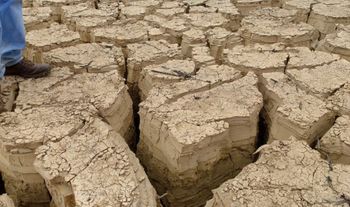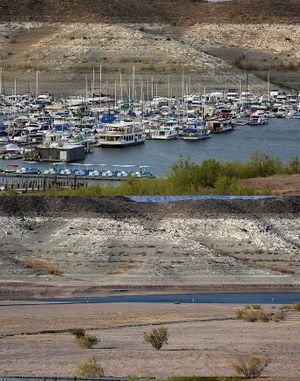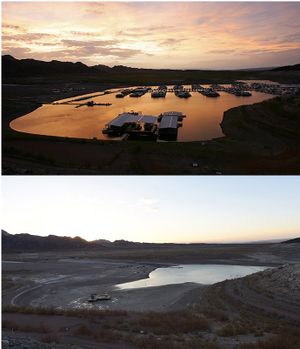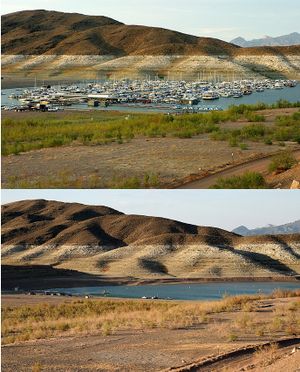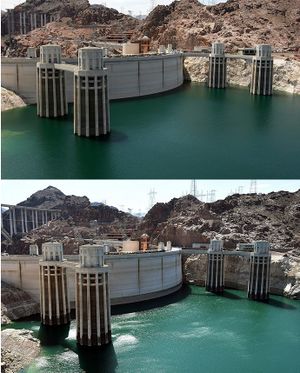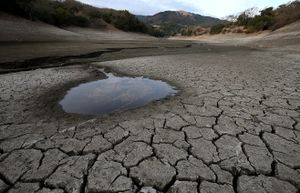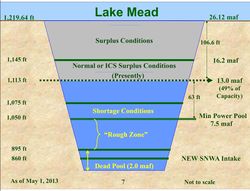Difference between revisions of "GCDAMP- Drought Page"
(→Arizona's Colorado River Shortage Preparedness Workshop) |
|||
| Line 6: | Line 6: | ||
Arizona and its water users are prepared to handle the effects of the current drought and impending potential Colorado River shortage declaration which may occur as early as 2016, although more likely in 2017. | Arizona and its water users are prepared to handle the effects of the current drought and impending potential Colorado River shortage declaration which may occur as early as 2016, although more likely in 2017. | ||
| − | |||
These conditions are not unexpected. Arizona has been proactively building resilience and implementing innovative water management strategies to secure dependable water supplies. | These conditions are not unexpected. Arizona has been proactively building resilience and implementing innovative water management strategies to secure dependable water supplies. | ||
| − | |||
If shortage is declared in the near term, Arizona cities, towns, industries, mines and tribes using Central Arizona Project water will not see a reduction in their Colorado River supplies. On river municipalities, industrial users and agricultural water users in the Yuma area have the highest priority on the Colorado River system and will not be impacted. | If shortage is declared in the near term, Arizona cities, towns, industries, mines and tribes using Central Arizona Project water will not see a reduction in their Colorado River supplies. On river municipalities, industrial users and agricultural water users in the Yuma area have the highest priority on the Colorado River system and will not be impacted. | ||
| − | |||
A shortage declaration in the near term will eliminate CAP water supplies to the Arizona Water Banking Authority, a portion of the CAP water supply for groundwater replenishment, will impact agricultural users in central Arizona and may cause an increase in CAP water rates. | A shortage declaration in the near term will eliminate CAP water supplies to the Arizona Water Banking Authority, a portion of the CAP water supply for groundwater replenishment, will impact agricultural users in central Arizona and may cause an increase in CAP water rates. | ||
| + | Workshop Materials are available here - [http://www.azwater.gov/azdwr/ColoradoRiverShortagePrepardeness.htm] | ||
[[File:PIC- Drought in CA.jpg|350px|left]] | [[File:PIC- Drought in CA.jpg|350px|left]] | ||
Revision as of 12:20, 29 April 2015
This page is UNDER CONSTRUCTION
Arizona's Colorado River Shortage Preparedness Workshop
Arizona and its water users are prepared to handle the effects of the current drought and impending potential Colorado River shortage declaration which may occur as early as 2016, although more likely in 2017.
These conditions are not unexpected. Arizona has been proactively building resilience and implementing innovative water management strategies to secure dependable water supplies.
If shortage is declared in the near term, Arizona cities, towns, industries, mines and tribes using Central Arizona Project water will not see a reduction in their Colorado River supplies. On river municipalities, industrial users and agricultural water users in the Yuma area have the highest priority on the Colorado River system and will not be impacted.
A shortage declaration in the near term will eliminate CAP water supplies to the Arizona Water Banking Authority, a portion of the CAP water supply for groundwater replenishment, will impact agricultural users in central Arizona and may cause an increase in CAP water rates. Workshop Materials are available here - [1]
2007 Interim Guidelines ROD:
- D. Shortage Conditions
- 1. Deliveries to the Lower Division States during Shortage Condition Years shall be implemented in the following manner:
- a. In years when Lake Mead content is projected to be at or below elevation 1,075 feet and at or above 1,050 feet on January 1, a quantity of 7.167 maf shall be apportioned for consumptive use in the Lower Division States of which 2.48 maf shall be apportioned for use in Arizona and 287,000 af shall be apportioned for use in Nevada in accordance with the Arizona-Nevada Shortage Sharing Agreement dated February 9, 2007, and 4.4 maf shall be apportioned for use in California.
- b. In years when Lake Mead content is projected to be below elevation 1,050 feet and at or above 1,025 feet on January 1, a quantity of 7.083 maf shall be apportioned for consumptive use in the Lower Division States of which 2.4 maf shall be apportioned for use in Arizona and 283,000 af shall be apportioned for use in Nevada in accordance with the Arizona-Nevada Shortage Sharing Agreement dated February 9, 2007, and 4.4 maf shall be apportioned for use in California.
- c. In years when Lake Mead content is projected to be below elevation 1,025 feet on January 1, a quantity of 7.0 maf shall be apportioned for consumptive use in the Lower Division States of which 2.32 maf shall be apportioned for use in Arizona and 280,000 af shall be apportioned for use in Nevada in accordance with the Arizona-Nevada Shortage Sharing Agreement dated February 9, 2007, and 4.4 maf shall be apportioned for use in California.
- This still doesn’t include shortages to Mexico..
- Date: Posted_150209 (Meeting held December 2014)
- Subject: Drought Impacts & Solutions for Water Supply Management
- From: Western Governor's Association
- Link: LINK to Report
